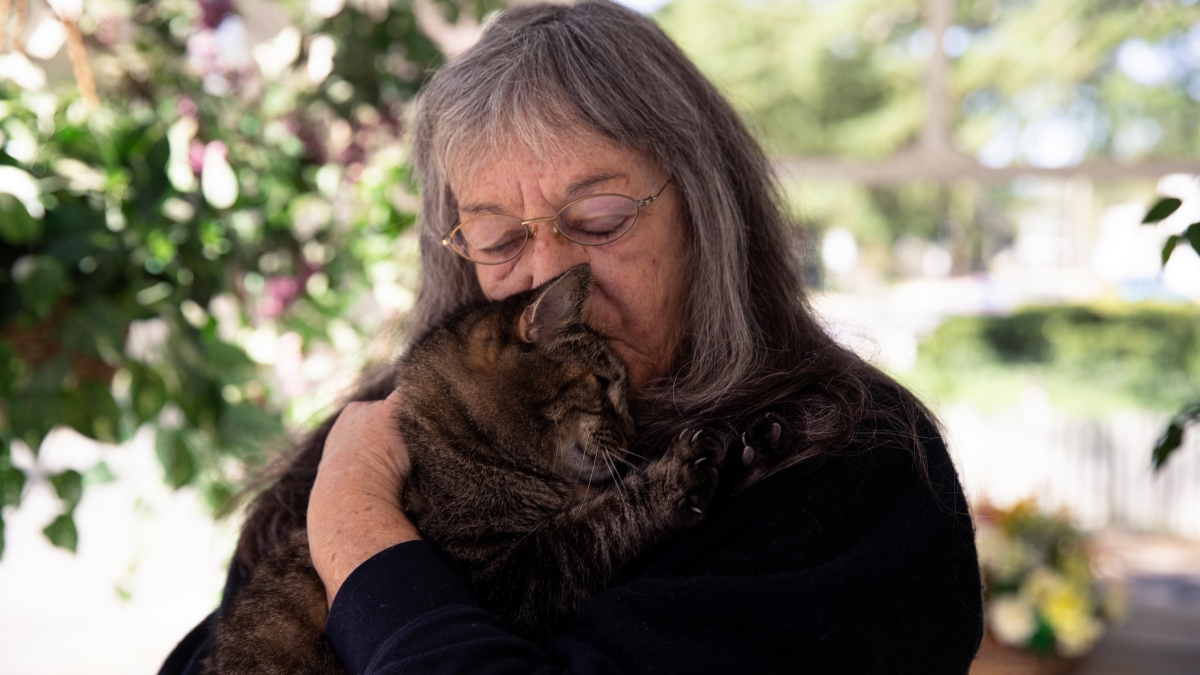ASU researchers partner with Meals on Wheels America for pet programming study

A new study underway by ASU researchers seeks to understand the needs of Meals on Wheels clients and their pets, and how pets can influence social isolation and loneliness. Image courtesy Meals on Wheels America
In the United States, one in four older adults is considered to be socially isolated and 43% report feeling lonely. Both of those things have a significant impact on their health.
“We know that social isolation and/or loneliness have been associated with a multitude of increased adverse health factors, including increased mortality, increased risk of developing dementia, chronic diseases, heart failure and increased emergency department visits,” said Aaron Guest, assistant professor in the Edson College of Nursing and Health Innovation at Arizona State University.
Guest and his colleague, Assistant Professor Allie Peckham, are both researchers in Edson College's Center for Innovation in Healthy and Resilient Aging.
The pair has partnered with Meals on Wheels America for an evidence-informing research project funded by PetSmart Charities that seeks to “understand the needs of Meals on Wheels clients and their pets, and how pets can influence social isolation and loneliness,” Peckham said.
The work will build on previous large-scale research Meals on Wheels America started in an effort to understand the role pets play in their clients' lives and to identify opportunities for additional pet programming.
“Last year’s Meals on Wheels Pet Programming and Client Needs Assessment uncovered that nearly 100% of pet-owning Meals on Wheels clients reported that their pet brings happiness to their life, and 95% agreed that having a pet around makes them healthier,” said Laura Belazis, Meals on Wheels America senior director of strategy and impact.
Now the organization, which supports more than 5,000 community-based programs across the country, is hoping to not only identify the needs of pet owners, but also barriers to pet ownership among older adult populations.
ASU News spoke with the Center for Innovation in Healthy and Resilient Aging research team and the Meals on Wheels America Strategy and Impact team, which includes its director, Belazis, and manager, Morgan Hultquist, to learn more about the upcoming project and its potential impact.
Allie Peckham
Question: How will the study work/what will you be doing?
Allie Peckham: We will be working closely with Meals on Wheels America to conduct over 400 interviews with Meals on Wheels clients — those with and without pets. We will be asking questions about pet ownership, how people bond with their pets, individuals' experience with isolation and loneliness, and barriers individuals may experience to pet ownership and social connectedness. We will be originating interviews from Edson College. We will be taking our information, along with data previously obtained, to identify overarching themes and the opportunities to intervene and reduce isolation and loneliness among older adult populations.
Q: What do we know about loneliness and isolation and the impact it has on older adults? Has the pandemic exacerbated this?
Aaron Guest: In 2020 the National Academies of Sciences, Engineering, and Medicine released a groundbreaking report that found that nearly a quarter of community-dwelling older adults are considered to be socially isolated. Additionally, almost half of older adults report feeling lonely ... we know that isolation and loneliness have negative effects on this population’s health. Data continues to come out regarding the pandemic — but a lot of the evidence is pointing to increased rates of isolation and loneliness among older adults during the pandemic.
Aaron Guest
Q: What does current research say about whether pets can help with reducing loneliness and isolation?
Guest: You know, it is fascinating. We are still working to understand some of the underlying mechanisms of loneliness and isolation. Data, however, shows that pet ownership does seem to reduce feelings of both isolation and loneliness. It is thought this is in part due to the companionship they provide — as well as some of the physical stimulations they provide (touch). Importantly, they also provide opportunities for exercise and engagement with others while caring for the animal. Pet ownership has some additional benefits, such as reducing depression and boosting an individual’s positive affect.
Q: How has your current pet programming impacted recipients?
Laura Belazis: Last year’s Meals on Wheels Pet Programming and Client Needs Assessment was the first study of that scale we had conducted of pet services across local Meals on Wheels programs, and the results were striking. Seven out of every 10 Meals on Wheels clients in the study who classified as lonely and at risk for social isolation lived alone, and this cohort also had the highest bonding scores with their pets on a pet attachment scale, underscoring the level of companionship that pets offer to people who live alone.
Also, nearly half of clients receiving pet support (48%) did not have anyone else to help them with their pet needs other than Meals on Wheels.
At the same time, our study found that 97% of pet-owning Meals on Wheels clients agreed that having a pet made them feel less lonely and made their family feel more complete. And perhaps most telling, 81% of clients receiving pet assistance said that Meals on Wheels made it possible for them to keep their beloved pet companion.
Morgan Hultquist
Morgan Hultquist: One Meals on Wheels client recently shared, “I don’t know if you understand how important Meals on Wheels is and what a difference (it) makes. I cannot go out now because of my health. COVID would kill me. I am immunocompromised and could not fight it off. Because of Meals on Wheels, I do not have to risk my life to go out and get food for me or my little dog.”
Q: Depending on what the researchers find, what are some possible outcomes from this study?
Hultquist: We are hoping to gain a better understanding of older adults’ needs for pet services, as well as what barriers they may be experiencing in accessing those services. Such findings will help Meals on Wheels America and local programs to more clearly identify resources and develop programming to meet those specific needs.
We are also interested in learning more about how animal bondedness influences social isolation and loneliness, digging deeper into some of the findings from our initial research that revealed high levels of bonding among older adults who were lonely and at risk for social isolation.
The findings from this upcoming study will ultimately help local programs further develop and expand their pet assistance services and build support in their communities, fostering more sustainable programming capable of making a greater impact over time.
Q: Can you talk about collaborating with researchers from the Center for Innovation in Healthy and Resilient Aging?
Laura Belazis
Belazis: We are thrilled to have the opportunity to collaborate with this team of researchers who bring with them such strong academic expertise, particularly as we look to analyze the results of our research and understand its implications. We know we have a valuable thought partner in the Center for Innovation in Healthy and Resilient Aging, who will help us clearly see how we can best learn from and apply the results of our work together. These researchers are incredibly proactive and thoughtful in their approach to their work, and they’re a delightful team to work with.
Q: What else do you want people to know about this project?
Belazis: Meals on Wheels America values following a data-informed approach when designing programming or selecting interventions to help support and expand. Our flourishing partnership with PetSmart Charities has allowed us to greatly expand our social connection research efforts in this area to contribute to our growing pool of valuable data. This partnership has also made it possible for us to provide more key resources and opportunities for pet assistance to local Meals on Wheels programs in communities across the country, which consistently receive positive feedback from those programs.
Guest: We are looking forward to this project and partnership with Meals on Wheels America.
Those who are interested in this project can reach out to Guest at aaron.guest@asu.edu, or follow @Aaron_Guest on Twitter for updates.
More Health and medicine
College of Health Solutions program doing its part during Salute to Service
It wasn’t always easy for Marine veteran Chuck Hale when he first returned to civilian life. But he’ll never forget the help he…

What makes human culture unique?
Why is human culture — the shared body of knowledge passed down across generations — so much more powerful than animal cultures?“…

ASU honors students work on HPV research as part of Barrett College's largest-ever group thesis
Not every undergraduate student comes across the opportunity to do research as part of a team. Even fewer have had the chance to…



